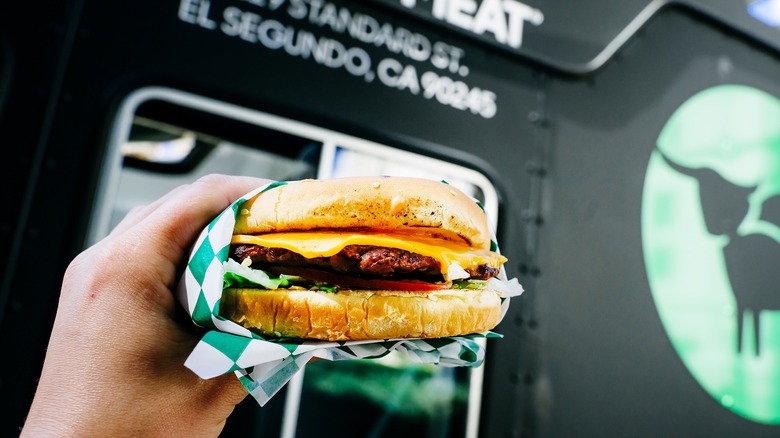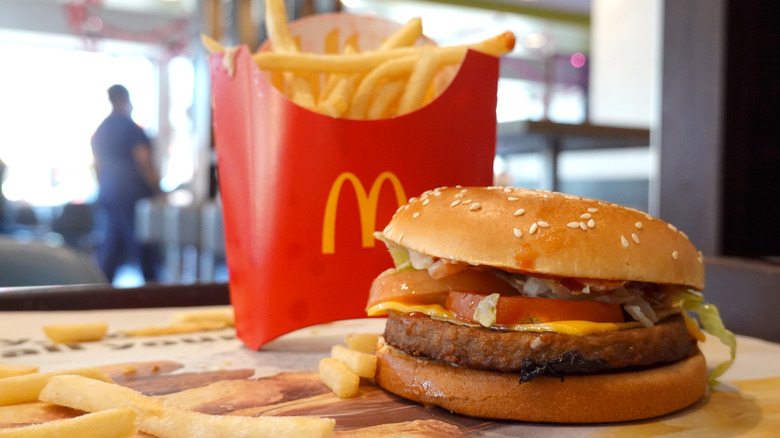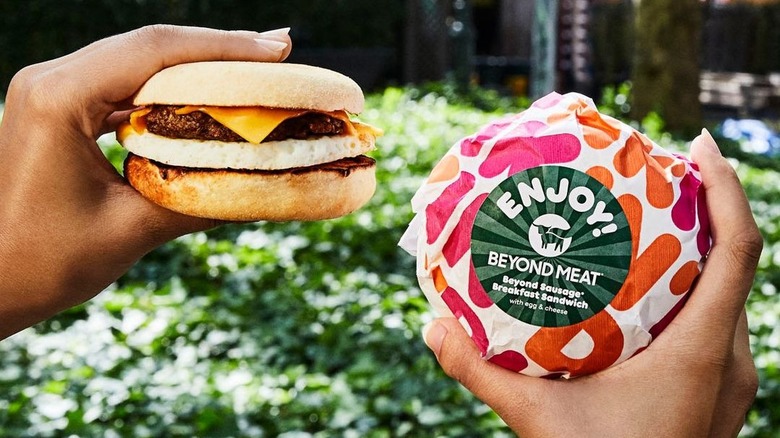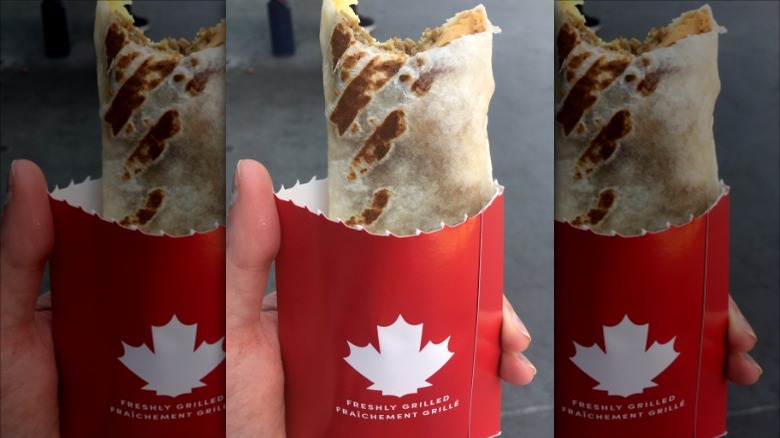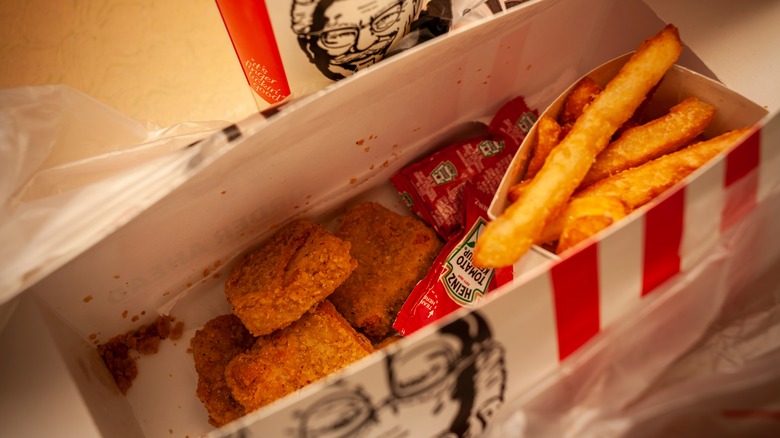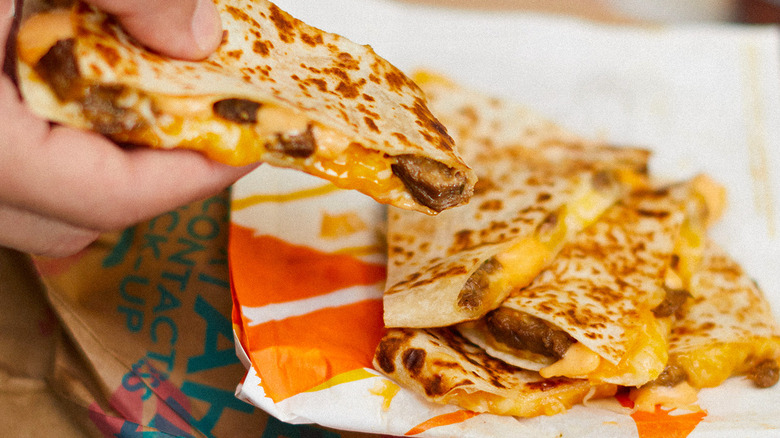6 Times Beyond Meat Failed At Fast Food
In 2019, plant-based meat company Beyond Meat was on top of the world. The company had just gone public, and reached a market value of over $11 billion. Beyond Meat started out by retailing its products in grocery stores. The brand's growing popularity saw the company sign deals with several fast food brands, most notably McDonald's and Yum! Brands, which owns KFC, Pizza Hut and Taco Bell. Many claimed this was proof that the future was plant-based.
Unfortunately for Beyond Meat, the following years were difficult ones, none more so than 2022. In that year, the company's stock dropped by around 80%, causing Beyond Meat to take drastic cost cutting actions. As a result, some 200 jobs were expected to be lost. The reasons for the drastic change in the company's fortunes are many and varied. As founder Ethan Brown explained, "The fourth quarter of 2022 ends a challenging year for our business and category, one marked by persistently high inflation and trading down by consumers among proteins, slowing economy in key markets, and increased competitive activity," (via Insider).
A factor that Brown didn't touch on was that many of Beyond Meat's fast food partnerships have stalled, with some products receiving less than stellar receptions. In this article we highlight six different Beyond Meat fast food products that have launched to much acclaim, only to fail on the big stage.
1. McDonald's McPlant Burger
No product launch has better demonstrated the cycle of hype and ensuing disappointment that surrounds Beyond Meat fast food products than McDonald's McPlant burger. The patty of the McPlant was formed of peas, rice, and potatoes and was first made available in global markets like the United Kingdom. Here it was a hit. Back in the United States, February 2022 saw the McPlant tested in 600 McDonald's restaurants across the nation. After six months, the McPlant was withdrawn from these restaurants amid low demand. There have be no reports of further tests or a nationwide launch.
The exact reason why the McPlant flopped in America is hard to say. It is likely a combination of factors. For one, the burger was cooked on the same grill as beef burgers, meaning it was neither vegan or vegetarian. Interestingly, this isn't the case in the United Kingdom.
Another issue was that the majority of McDonald's customers were not swayed by a plant-based alternative. As Bhagyashree Katare, an assistant professor at Purdue University, explained it to The Guardian, "If I'm spending money in a restaurant, and I'm a meat eater, why would I spend money on plant-based meat? I would rather eat an actual burger ... It's a technology, and it takes a long time for people to trust the technology and adopt it. I think that's where plant-based meat is. Maybe the technology will improve, and it will get better health-wise."
2. Dunkin's Beyond Sausage
When Beyond Meat was at the height of its powers in 2019, the company collaborated with Dunkin' to roll out what was the biggest plant-based meat substitute launch in history. Dunkin's Beyond Sausage Sandwich was a huge hit during its trial run in Manhattan, selling double what Dunkin' predicted. The early success saw Dunkin' launch the Beyond Sausage Sandwich across its 9,000 stores two months before initially planned. The sandwich had a similar taste and texture to Dunkin's original sausage muffin. The Beyond Meat version contained 29% less total fat, 33% less saturated fat and fewer calories, cholesterol and sodium, a factor thought to be key to its initial popularity.
The sandwich was available across the nation for less than two years. In 2021, Dunkin' pulled the Beyond Sausage Sandwich from the majority of its restaurants. It has been suggested that the sandwich flopped because of its cost. The Beyond Sausage Sandwich retailed at $4.29. For this amount you were served Beyond Meat sausage, an egg, and a slice of cheese in a muffin. Of course, vegans had to order the sandwich without the egg or cheese but the price remained the same. This apparently caused a lot of frustration in the vegan community and may have ultimately contributed to the sandwich's decline in popularity.
3. Tim Hortons' entire meatless range
Tim Hortons was another brand that leapt at the chance to serve Beyond Meat products in 2019. This was especially interesting given that other brands owned by Tim Hortons' parent company, Restaurant Brand International, used products made by Impossible Foods. In May of that year, Tim Hortons trialed the Beyond Meat sausage in three different breakfast sandwiches. These options proved popular enough to be nationally distributed by June. July saw Beyond Meat burgers added to the menu.
In September 2019, just three months after the full range of Beyond Meat products were made available, Tim Hortons pulled its Beyond Meat products from all the restaurants outside of British Columbia and Ontario. Beyond Meat products were taken off the menus in these two provinces a few months later. Sylvain Charlebois, a researcher and professor in food distribution explained why the collaboration failed to CBC: "Timmies is all about coffee, doughnuts and muffins. They just rode on this Beyond Meat bandwagon, and that's dangerous because they tried to capitalize on a brand and not necessarily a product ... It's like the pizza at McDonald's. It was a disaster back in the '80s because nobody goes to McDonald's to eat pizza."
Interestingly, this failure did not put Tim Horton's off plant-based meats. In the spring of 2022 it was announced that the brand had agreed to work with Beyond Meat's prime competitor, Impossible Foods, offering a Harvest Breakfast Sandwich and Harvest Breakfast Wrap, both made with Impossible Sausage.
4. Pizza Hut's Pepperphoni
All meat substitutes are extremely complex to make. Yet none have posed quite so big of a challenge as pepperoni. In an investigative article, Bloomberg reported that Beyond Meat's attempts to produce pepperoni had been long, arduous, and expensive. What's more, the final product was repeatedly rejected by Pizza Hut over concerns about cost and the company's ability to produce the product at scale. Since trialing in 2021, Beyond's vegan pepperphoni has not been served at Pizza Hut in America.
To make matters even worse, a Beyond Meat plant in Pennsylvania — where the pepperphoni is partly produced — has been shown to have outbreaks of mold, as well as bacteria including listeria. Speaking to Bloomberg, food-safety attorney Bill Marler outlined how bad the environment was inside the factory: "Mold growth takes a while — that underscores a lack of cleanliness. If neat and tidy is 1 and filthy is 10, I'd put this at an 8." Beyond Meat reported that the plant had passed subsequent inspections.
5. KFC's Beyond Fried Chicken Nuggets
KFC's Beyond Fried Chicken Nuggets were offered for a limited time in 2022, and suffered from many problems that have dogged Beyond Meat's other fast food offerings. One of the main issues facing Beyond Fried Chicken Nuggets was the cost, which was extortionate. In Dallas, people reported six nuggets costing $8. Another is that the nuggets are not suitable for vegetarians or vegans, possibly due to them being cooked in the same oil that the meat is. As we have previously seen, this often alienates vegans and vegetarians who would have otherwise purchased the product.
Finally, the nuggets are reported as having a dense texture that many find unpleasant, as one reporter for Consumer Reports explained: "They are dry and rubbery to me and not at all a meat texture. It looks more like KFC tofu, although when you bite them they do look a bit more like compressed chicken meat. The texture was tough and a bit grainy, and the nuggets were greasy under the breading and had a slight aftertaste."
6. Taco Bell's Carne Asada
October 2021 saw Beyond Meat failing to impress Taco Bell with its take on carne asada. So bad was Taco Bell's response to the prototype product that two Beyond Meat employees who had worked on the carne asada project were fired. Joseph Szala, the manager of a restaurant consultancy company, highlighted that Beyond Meat's product had failed to meet exacting standards, telling Bloomberg, "Taco Bell spends a lot of money on R&D and they have a high standard; the food really does matter to them ... This has to be 100% on the nose, amazing and delicious." Shares of Beyond Meat fell by around 7% after the news broke.
Fortunately for Beyond Meat, the company seemed to have used this particular failure to its advantage. A new Beyond Meat carne asada was tested across 50 restaurants in Ohio towards the end of 2022. Speaking to VegNews, Taco Bell's Senior Nutrition Specialist, Marissa Thiry, expressed her excitement about the product: "Good things come to those who wait and this one took time but we wanted to make sure we got it right." The product went on to receive good reviews, suggesting that this time, Beyond Meat might have finally nailed a fast food product. However, you won't find it on Taco Bell menus today. So either the limited time item will make a reappearance, or it looks like Beyond Meat still has work to do to achieve lasting fast food success.
